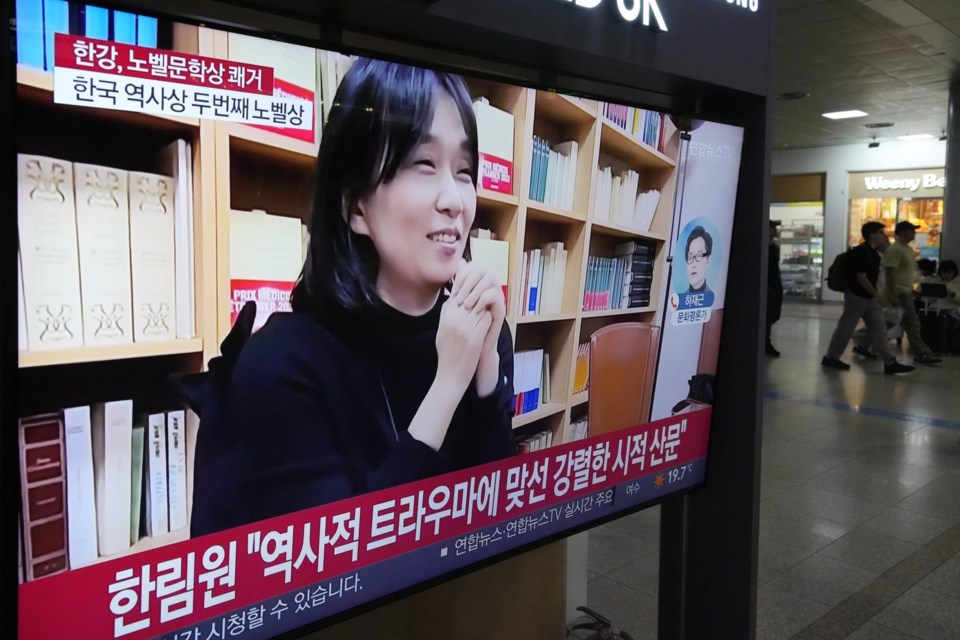SEOUL, South Korea (AP) — South Koreans reacted with joy and astonishment on Thursday after learning that homegrown writer , an unexpected moment that stoked national pride about the country’s growing cultural influence.
Han, known for her experimental and often disturbing stories that explore human traumas and violence and incorporate the brutal moments of South Korea’s modern history, is the country’s first writer to win the preeminent award in world literature.
Han's triumph adds to the growing global influence of South Korean culture, which in recent years included the successes of director Bong Joon-ho’s Oscar-winning “Parasite,” the brutal Netflix survival drama “Squid Game” and K-pop groups like BTS and BLACKPINK.
“I’m so surprised and honored,” Han, 53, said in a telephone interview posted on the X account of the Nobel Prize.
As the news spread in South Korea, some online bookstores temporarily froze following a sudden jump in traffic. South Korean social media were flooded with jubilant messages expressing admiration and pride. Some internet users found it meaningful that Han was the first Asian woman to win the award and portrayed it as a statement toward the country’s traditionally male-dominated literature scene.
“It’s always the women who do the big things,” one Facebook user wrote.
In South Korea’s parliament, multiple government hearings were paused as lawmakers cheered and applauded Han’s award.
While visiting Laos for a meeting of Asian leaders, South Korean President Yoon Suk Yeol issued a statement, congratulating Han on her award, calling it a “great achievement in the history of Korean literature” and a “special moment for the nation.”
“You converted the painful wounds of our modern history into great literature,” Yoon wrote. “I send my respects to you for elevating the value of Korean literature.”
Han, the daughter of renowned South Korean novelist Han Seung-won, made her publishing debut as a poet in 1993. She won the International Booker Prize in 2016 for the novel “The Vegetarian,” a story in which a woman’s decision to stop eating meat brings devastating consequences and raises concern among family members that she’s mentally ill. The book sold more than 100,000 in the U.S.
Another one of Han's well-known novels is “Human Acts,” which is set in 1980 in her birth city of Gwangju and follows a boy searching for the body of a friend who was killed in a violent suppression of a student protest. South Korea’s former military government that year sent troops to Gwangju for a bloody crackdown on pro-democracy protesters that left around 200 people dead and hundreds of others injured.
“The decision came all too sudden. I could also describe it as a feeling of bewilderment,” Han Seung-won, Han’s father, told reporters Friday about the moment he heard the news that his daughter had won the Nobel Prize.
He praised his daughter's writing, which he described as poetic and exhibiting unique “fantastical realism," and also commended British translator Deborah Smith, who translated “The Vegetarian” and “The White Book."
“The translator has somehow managed to convey Han Kang’s sentences, bringing to life the delicate and beautiful prose and melancholic sensibility," he said.
Han Kang’s award generated excitement among South Korean writers and critics, who in comments to local media expressed hope that it would bring more global attention to South Korean literature. But it remains to be seen whether Han’s stories would become widely popular among casual readers around the world, said Brother Anthony of Taize, a British-born scholar and prolific translator of Korean literature.
“It’s not always an easy read,” he said, describing how her novels are often complicated stories about communication failures, misunderstandings, “unhappy people and troubled relationships and pain.”
If Han's works have anything in common with South Korea's other cultural products that garnered international acclaim in recent years, it is that they often reflect the dark side of the country’s society. Both Parasite and Squid Game provided biting commentaries on the country’s deepening inequality and other problems that have many young and poor people describing their lives as a hellish nightmare.
South Korea has one of the largest gaps between rich and poor among developed economies and is grappling with decaying job markets, soaring household debt and a record-low birth rate as struggling couples put off having babies. The country also struggles to deal with the pains of its brutal transition from dictatorship to democracy.
“Korean society is rather dark and it’s probably the aspect that resonates,” Brother Anthony said.
Jung Yoon-young, a 49-year-old resident in Seoul, said Han’s triumph was a refreshing moment for the country during depressing times.
“It’s a miraculous event and really a breath of fresh air,” she said. “I’m grateful and proud.”
Kim Tong-hyung, The Associated Press



